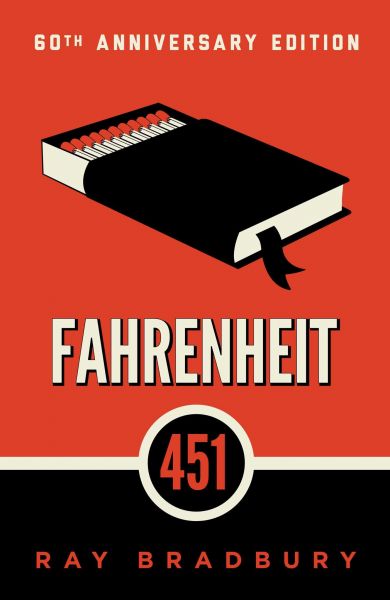A Dissident's Dictionary-Fahrenheit 451
Does my reader feel unease about the trends in our society? Are you skeptical about its underlying value system—if there is a value system? Are you looking for a philosophical foundation to regain your footing and provide the basis for organized dissent? If you cannot check or alter the trends, you can at least understand their intentions.
Look for a good piece of dissident literature—fiction, not in philosophy. I revere Hegel and Locke, but Americans need something topical and personal, and I may have the book for you: Fahrenheit 451. More than anything else, Fahrenheit protests the loss of strength in the nation's intellectual culture.
It laments the public's retreat from the jagged field of important ideas. One character says, "Films and radios, magazines, books leveled down to a sort of paste-pudding norm." The speaker works for an arm of law-enforcement and adds, "Authors full of evil thoughts! Lock up your typewriters!" He says their writing should become "a nice blend of vanilla tapioca."
Critics describe Fahrenheit as a protest against censorship. Bradbury would say the critics did not read it closely enough. He conveys that American citizens fear important books and actually resent their intruding on the public's feeling of contentment, or institutional lassitude.
The government employs a law-enforcement arm to burn dangerous books, intimidate the authors, and reassure the public. It does what governments do the World over—carrying out the wishes of the public.
On a hunch, I googled "book censorship in America" and found, not surprisingly, that Fahrenheit 451 itself has faced censorship. Bradbury actually mentions censorship, although he alleges that the public itself draws back from books, not the churches or political parties.
Some books are just destined to give people the yikes—not like Stephen King or Jeffrey Eugenides. Obscenity and violence cannot scare people like Fahrenheit 451 can—the fact that it hits so close to home, so close to where people live.
Years ago, the censorship of books originated mostly in Conservative quarters—Christians, Cold-warriors, decency advocates opposed to obscenities, profanities, and racial slurs, and other similar groups, because Conservatives controlled the strings of the society and held sway about its cultural tastes. In recent years, however, the shoe has switched to the other foot, as the emphasis in cultural values has altered the fundamental givens in our society.
Bradbury must have known that Fahrenheit would become politically incorrect. People would talk about it a lot, without comprehending its warnings; and he was right. The government does not need to censor anything. Americans have chosen to stop reading on their own. They define themselves by affiliation, not by studying anything.
None of this should surprise anyone. Our leaders have pushed the tolerance-and-diversity trip for so long, most Americans have little sense of a foundational philosophy, and count on the dominant media to define our lives, that conceal the dangerous relativism that lurks behind it. We have little personal sense of who we are or where they are going. The society has such weird dimensions, you can get yourself in trouble just by complaining about them.
People react weirdly to these conditions. In Fahrenheit 451, the reader learns that Guy and his wife Mildred have no children. Their friend Mrs. Phelps is also childless. Put on the spot by Guy, she admits "No one in his right mind, the good Lord knows, would have children!" Selff-conscious over this admission, she resents Guy for revealing how fear causes her to retreat from life, how it constricts her personal growth and character.


